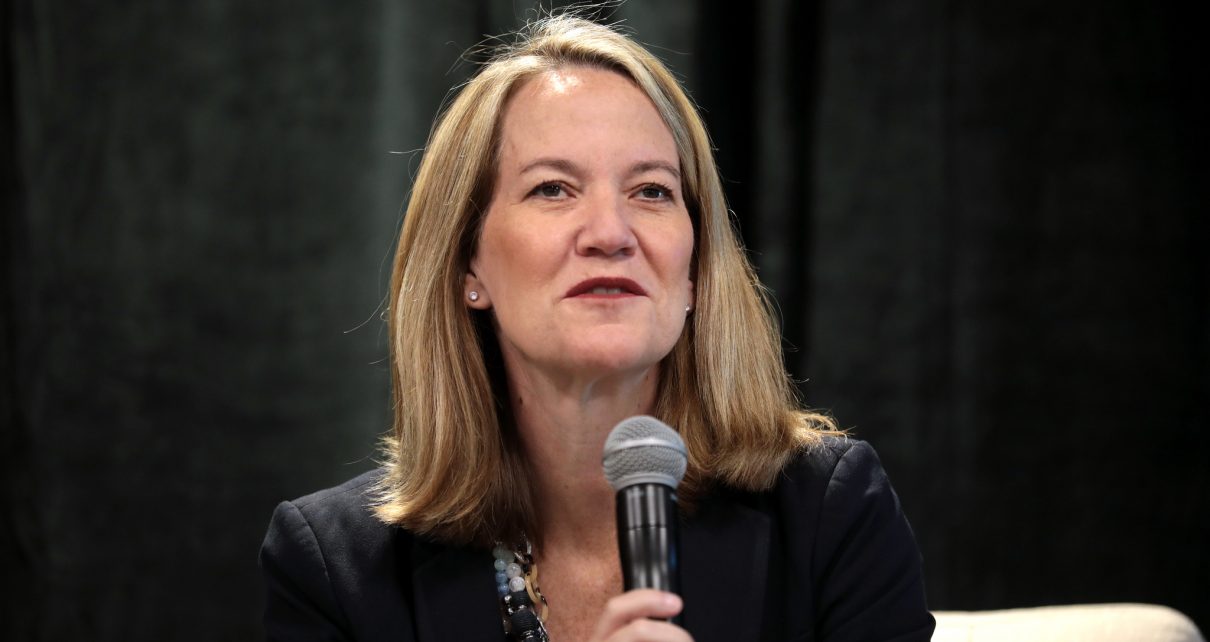
Kris Mayes speaking with attendees at the at the Arizona Commerce Authority in Phoenix, September 15, 2022. (Photo: Gage Skidmore)
Kris Mayes Seeks to Stop Export of AZ’s Water-Intensive Crops
Sen. Kern Senate Bill precludes AG from acting unilaterally
By Steve Kirwan, October 2, 2023 1:14 pm
The Arizona State Retirement System (ASRS) is attempting to divest fund-owned lands currently leased to UAE-owned Al Dahra Farms. The move comes amid dueling controversies over land sales and leases to foreign entities and groundwater access for water-intensive crops. As the State’s largest public pension fund, ASRS holds a wide array of financial vehicles, including farmland investments. However, this particular investment presents multiple concerns.
Last February, the Arizona House passed HB 2376, barring the sale, lease, or sublease of agricultural land to a foreign entity and clarifying requirements for foreign corporations to transact business in Arizona. Senate Bill 1115, a modified version of the House bill sponsored by then Commerce and Appropriations Chair Anthony Kern (R-LD27) that passed 16-14 in March, set aside existing leases to such entities. As a result, farms such as Al Dahra can continue operations, including exporting.

However, the foreign entity issue is not the only concern, according to Arizona AG Kris Mayes (D). Alfalfa farming is highly water-intensive, which the AG opposes, especially for State investment funds such as ASRS. A promise to cancel alfalfa farm groundwater use amid concerns over statewide drought conditions was central to her 2022 election, albeit for a different farm. During her campaign, Mayes spoke out against Saudi-owned Fodomonte, which operates a 3000-acre alfalfa farm exporting to Saudi Arabia. The water-deprived desert kingdom outlaws alfalfa farming, a critical cattle-feed crop, requiring it to operate in other countries. Mayes called the idea of allowing the export of a crop from one water-starved land to another “as outrageous as it is stupid given the current state of our water crisis in Arizona.” She stated that Fodomonte’s water rights directly harm La Paz County residents already struggling for sufficient water reserves.
But ASRS Director Paul Matson, who manages one of Arizona’s largest public trusts, said the decision to sell the Al Dahra Farms property had nothing to do with the AG’s concerns. He said efforts have been underway for years to find a buyer for the property. But Matson acknowledged that, although they’re actively marketing the fund-owned property as a green-energy solar or wind site, the sale would not prevent future agricultural-related groundwater pumping.
“To assume that changing the ownership of the land will change agricultural usage is simply not correct,” he said.
Mayes, in an interview with Capitol Media Services, stated, “It’s very clear that the people of Arizona don’t think it’s appropriate for us to be allowing companies that are controlled by Middle Eastern or any other foreign country to use our water for free to export alfalfa to their countries, especially when those countries have outlawed the use of water for growing alfalfa.”
She continued, “For me, at a minimum, farming operations that are owned by a foreign country and are essentially exporting out of country should be closely scrutinized — and aren’t appropriate,” Mayes said.
For ASRS, it all comes down to the bottom line, a fact the AG says she’s not ignoring. “I don’t think that sustainability and good investments are mutually exclusive,” Mayes said. “When you really think about it, how sustainable is an operation like a huge alfalfa farm in an area where the state Department of Water Resources has already said there is extreme groundwater table depletion?” Mayes added, “I believe it was a risky investment.”

Ultimately, she insists her opposition concerns the impact on residents, not just the ASRS fund. “When you layer on top of that the fact that you’re putting Arizona retirees in the position of harming their fellow citizens, it’s just a terrible idea,” Mayes said.
It’s unclear where the AG derives authority to exert pressure. When asked to show where the State Constitution authorizes her to enact laws or regulations over such ownership and leasing, Mayes replied, “I don’t see anything in the Constitution that prevents it, either.” She added, however, “It goes to the harm that was being done, or is being done, to local residents.”
Although Mayes campaigned on ending the farm’s water rights, Governor Katie Hobbs, a fellow Democrat, said that Mayes’ intention was not legally possible, especially in light of the Senate bill essentially reaffirming existing foreign entity sub-lease rights. Hobbs also addressed State statutes requiring trust lands to maintain their “highest and best use” and to maximize returns, advising that the state must treat Fodomonte like any other leased farm.
“It would be treating one leasehold differently than others,” Hobbs said, which also begs the question of whether the state can discriminate between crops when a large portion of other leased farms export produce internationally.
“That’s a really valid question,” Governor Hobbs told Capitol Media Services. “We can’t just unilaterally yank one lease because we don’t like that alfalfa’s going to Saudi Arabia.”
However, Mayes did get a small win, preventing Fodomonte from drilling two new high-capacity wells due to a technicality – the company’s approval to make improvements on state land had expired. However, it allows Fodomonte to continue pumping water from its existing wells.



